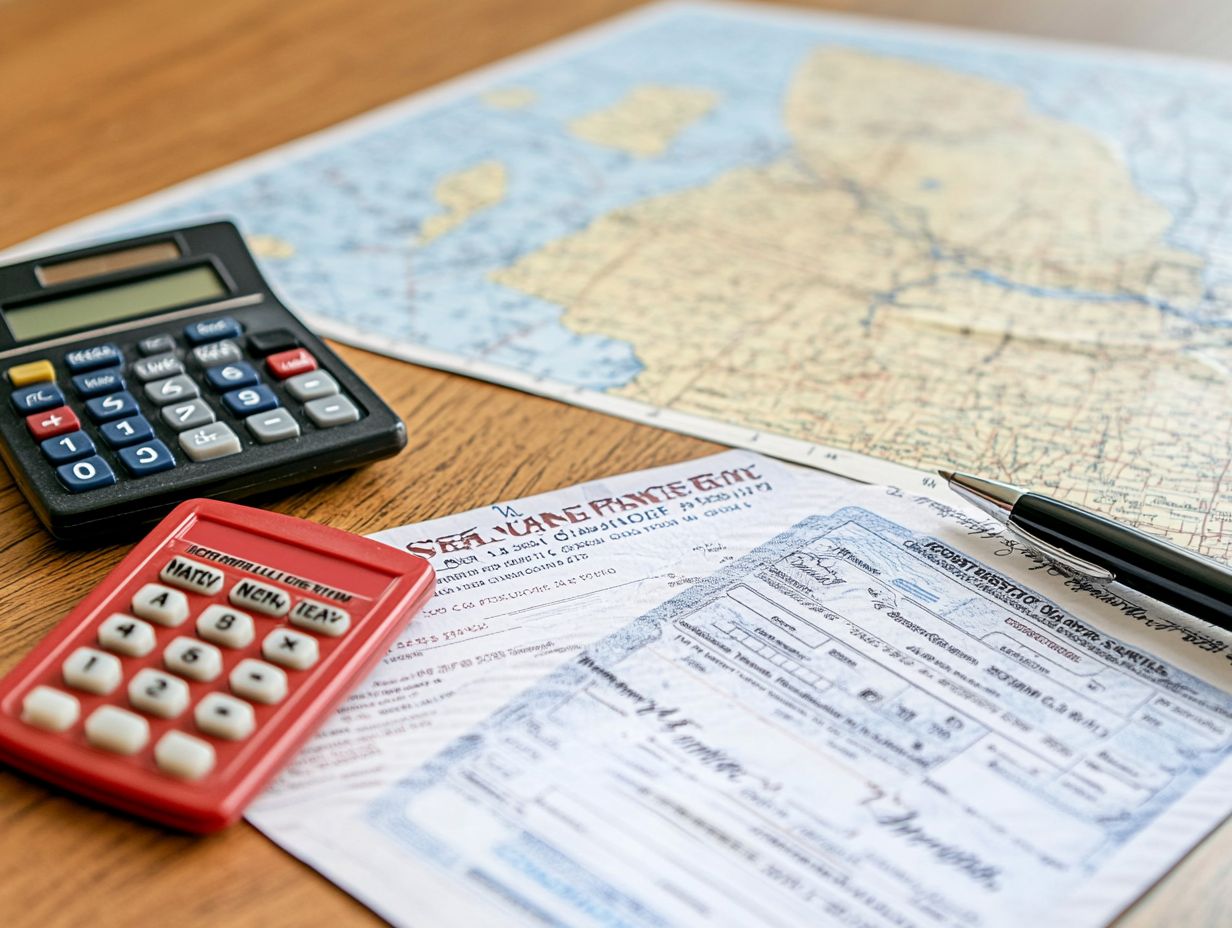Auto Insurance Requirements in North Carolina
Let s unlock the essentials of auto insurance in North Carolina! Grasping the fundamentals is vital for every driver. This guide outlines the state s requirements and regulations, covering everything from minimum coverage obligations to optional add-ons like collision and comprehensive insurance.
You ll discover how various factors, such as your driving record and the type of vehicle you own, can impact your rates. There is also a spotlight on discounts that could save you money.
It also covers the penalties for driving without insurance, ensuring you are thoroughly informed and safeguarded as you traverse the roads.
Contents
- Key Takeaways:
- Overview of Auto Insurance in North Carolina
- Minimum Coverage Requirements
- Optional Coverage Options
- Factors Affecting Insurance Rates
- Discounts and Savings Opportunities
- Penalties for Driving Without Insurance
- Frequently Asked Questions
- What are the minimum auto insurance requirements in North Carolina?
- Is it mandatory to have auto insurance in North Carolina?
- Are there any additional auto insurance requirements in North Carolina?
- Can I use out-of-state auto insurance in North Carolina?
- What happens if I do not have the minimum required auto insurance in North Carolina?
- Are there any exceptions to the auto insurance requirements in North Carolina?
Key Takeaways:

- North Carolina requires all drivers to have minimum liability coverage for bodily injury and property damage.
- Optional coverage such as collision and comprehensive can provide added protection for your vehicle.
- Factors like driving record and vehicle type can affect insurance rates, but discounts and savings opportunities are available to help lower costs.
Overview of Auto Insurance in North Carolina
Auto insurance in North Carolina is more than just a financial requirement; it s a legal mandate designed to protect you from unforeseen liabilities. With a rich selection of providers like Erie Insurance, State Farm, and Progressive, you can explore a variety of policy options tailored to meet the state s specific coverage requirements.
It s essential for you to understand the fundamentals of auto insurance, ensuring both compliance and financial security. Consider factors such as average costs and the potential repercussions of inadequate coverage. The state requires specific minimum coverage levels to guarantee that you are shielded against risks related to bodily injury and property damage.
State Requirements and Regulations
In North Carolina, you must navigate specific state requirements and regulations that dictate the minimum coverage levels necessary for legally operating a vehicle.
These regulations ensure that you have sufficient financial protection in case of an accident, which is essential for promoting overall road safety. Failing to meet these insurance requirements can lead to serious repercussions, including hefty fines, legal penalties, and the potential suspension of your driving privileges.
When obtaining a valid insurance policy, you’ll want to compare various providers to ensure they offer the necessary types of coverage and adhere to state standards. It s crucial to select reputable insurers that not only comply with these legal obligations but also provide the support and efficient claims handling needed to protect your financial interests.
Minimum Coverage Requirements
Understanding the minimum coverage requirements in North Carolina is essential for ensuring that you are financially safeguarded against potential liabilities, especially in the event of bodily injury or property damage from accidents.
The state has set specific limits for bodily injury liability, property damage liability, and uninsured motorist coverage, all designed to address the varied needs of its residents. Knowing these mandates allows you to navigate the roads with confidence, knowing that you have the protection necessary for unforeseen circumstances.
Bodily Injury and Property Damage Liability
Bodily injury and property damage liability are integral parts of auto insurance in North Carolina, designed to cover the costs related to injuries or damages you may cause to others in an accident.
With these types of coverage, you can be assured that if an accident occurs, you ll be able to compensate those affected for medical expenses, lost wages, and vehicle repairs. In North Carolina, the law sets minimum coverage limits at $30,000 for bodily injury per person and $60,000 per accident, along with $25,000 for property damage. Not keeping up with these insurance requirements could lead to serious penalties, such as hefty fines, license suspension, and skyrocketing insurance premiums.
This highlights the importance of having comprehensive coverage not just for your peace of mind but also to safeguard others on the road.
Optional Coverage Options

Beyond the essential minimum coverage requirements, North Carolina presents a range of optional coverage choices that can significantly bolster your financial protection. These include collision coverage, which helps pay for repairs if you hit another car, and comprehensive coverage, which protects you against a variety of non-collision-related incidents such as theft, vandalism, and natural disasters.
By selecting these options, you can create a stronger protection plan, ensuring you’re well-equipped to navigate various risks on the road.
Collision and Comprehensive Coverage
Collision coverage and comprehensive coverage are two vital options that offer enhanced protection beyond North Carolina’s minimum requirements.
Collision coverage specifically addresses damages to your vehicle from a collision with another vehicle or object. Comprehensive coverage protects you against unexpected events, ensuring you re safeguarded against the unpredictable twists that life throws your way.
By choosing both options, you can enjoy financial security and peace of mind, knowing you’re well-prepared for whatever comes your way.
Factors Affecting Insurance Rates
Various factors play a crucial role in determining auto insurance rates in North Carolina. Your driving record, the type of vehicle you own, and your demographic information all contribute significantly to the average cost of coverage for residents.
Understanding these elements can enable you to make informed decisions regarding your insurance options.
Driving Record and Vehicle Type
Your driving record and the type of vehicle you choose to drive are pivotal factors that can significantly influence your auto insurance rates in North Carolina.
Maintaining a clean driving record free from accidents or traffic violations usually leads to lower insurance premiums. Insurers view responsible drivers as less risky, which is a win for your wallet. Conversely, a history of accidents can escalate your costs, reflecting the higher likelihood of future claims.
The make and model of your vehicle also play a crucial role in determining your insurance rates. Cars with high safety ratings may enjoy lower premiums because they are less likely to result in serious injuries during an accident. On the other hand, vehicles frequently targeted for theft can lead to higher rates due to increased risk of loss.
Discounts and Savings Opportunities
Numerous insurance providers in North Carolina offer a range of discounts and savings opportunities to help you lower your auto insurance expenses. This not only alleviates the financial burden but also simplifies your journey toward meeting the state’s legal requirements.
Ways to Lower Insurance Costs

To effectively lower your auto insurance costs in North Carolina, explore a variety of strategies that take advantage of available discounts and savings opportunities.
Proactively maintaining a good credit score can significantly influence your premium rates. Insurers often view a higher credit score as a sign of reliability, translating into lower costs over time.
Consider bundling your auto insurance with home or renter’s insurance. This approach can yield substantial multi-policy discounts from reputable providers, potentially saving you hundreds each year.
Completing safety courses recognized by many insurers not only sharpens your driving skills but may also earn you additional savings. Companies like State Farm and Allstate offer discounts to policyholders who complete approved defensive driving classes, creating a win-win situation for both safety and cost reduction.
Don’t miss out on discounts! Act now to save on your auto insurance.
Penalties for Driving Without Insurance
In North Carolina, driving without insurance is a serious offense. It can lead to large fines and a notice from the DMV, as the state strictly enforces insurance laws.
Make sure you have insurance to protect yourself from serious penalties!
Fines and Potential Legal Consequences
The consequences of driving without insurance in North Carolina can be daunting. You might face large fines and other issues that affect your ability to drive.
If you’re caught without insurance, fines can range from $50 to $1,000, depending on your situation. You could also get points on your driving record, which may raise your future insurance premiums.
If this isn’t your first offense, expect harsher penalties, including possible suspension of your driving privileges. This not only brings immediate challenges but also leads to higher insurance rates due to your history of uninsured driving.
Being informed can help you navigate through this tough road ahead.
Frequently Asked Questions
What are the minimum auto insurance requirements in North Carolina?
Drivers in North Carolina must have liability insurance with these minimums: $30,000 for bodily injury per person, $60,000 for bodily injury per accident, and $25,000 for property damage per accident.
Is it mandatory to have auto insurance in North Carolina?

Yes, it is mandatory to have auto insurance. All drivers must have liability insurance to operate a vehicle legally in the state.
Are there any additional auto insurance requirements in North Carolina?
Along with liability insurance, North Carolina requires insurance that protects you if you’re in an accident with someone who doesn’t have enough insurance, with the same minimum limits as liability insurance.
Can I use out-of-state auto insurance in North Carolina?
No, out-of-state auto insurance is not accepted. All drivers must have an insurance policy from a company authorized to do business in North Carolina.
What happens if I do not have the minimum required auto insurance in North Carolina?
If you’re caught driving without the required insurance, you may face fines, license suspension, and other legal issues. It’s crucial to have the right coverage to avoid these consequences.
Are there any exceptions to the auto insurance requirements in North Carolina?
Yes, some exceptions exist. Drivers with a valid policy from a self-insured company may be exempt. Drivers who have a bond or cash deposit of at least $85,000 with the state treasurer can also be exempt from insurance requirements.




